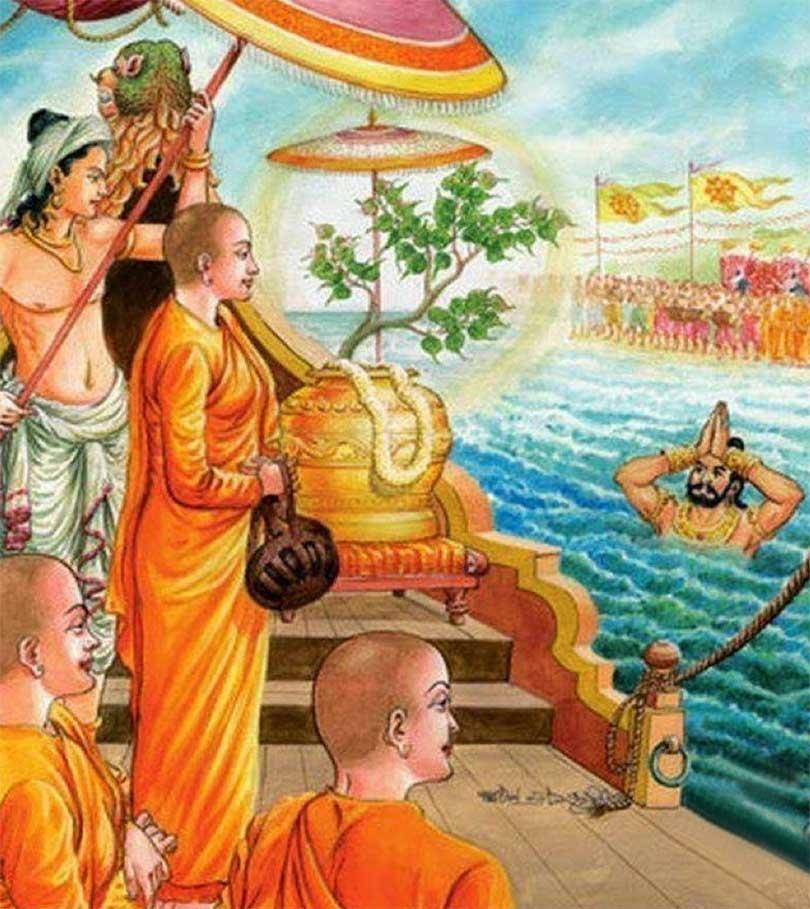11 Dec 2019 - {{hitsCtrl.values.hits}}

 Anula, a Hindu convert wished to enter the Bhikkuni Order. Arhant Mahinda informed his inability to do so, but, advised the King Devanam Pitatissa to send a message to Arhant Mahnda’s father, Emperor Asoka and get the services of his sister Theri Sangamitta, for the purpose as her samanera son was already in Sri Lanka with the uncle, Mahinda thera. Sangamitta demanded her father, King Asoka, stating “Father, the order of my brother is important and the ladies who are to be ordained in Lankadveepa are many, it is absolutely essential that I visit them”. Emperor Asoka sent daughter Sanghamitta following the two requests, from his friend, King of Lanka, and by his son Mahinda. She was accompanied by a retinue of ten erudite bhikkunis to Sri Lanka.
Anula, a Hindu convert wished to enter the Bhikkuni Order. Arhant Mahinda informed his inability to do so, but, advised the King Devanam Pitatissa to send a message to Arhant Mahnda’s father, Emperor Asoka and get the services of his sister Theri Sangamitta, for the purpose as her samanera son was already in Sri Lanka with the uncle, Mahinda thera. Sangamitta demanded her father, King Asoka, stating “Father, the order of my brother is important and the ladies who are to be ordained in Lankadveepa are many, it is absolutely essential that I visit them”. Emperor Asoka sent daughter Sanghamitta following the two requests, from his friend, King of Lanka, and by his son Mahinda. She was accompanied by a retinue of ten erudite bhikkunis to Sri Lanka.
According to one legendary, [as in every great happening any research is preceded by legendary reporting during the expedition of Sangamitta theri to Sri Lanka, the chronicle says, Nagas surrounded the Bodhi sapling; 32 year-old Sangamitta drew them away by camouflaging the form of Garuda.] It was on unduvap poya day that the Bo-Sapling was majestically planted at the Mahamegha Udyanaya. Thousands of Anula’s companions also received with pabbajja ordination, creating the Bhikkuni Sasana in the island. “Theravāda Buddhism’s Female Monastic Order was established not only here but also in Burma and Thailand subsequently. The King’s nephew, Prince Arittha, entered the Order along with his friends.
Sri Maha Bodhi, the oldest known tree in the world was brought by her to Sri Lanka on Sanghamitta Day or Uduvap Poya. These great occurrences, exchange of gifts of Dhamma were possible as a result of Consensual governing systems, healthy foreign relations that existed during monastic rule in the ancient times in the sub-continent. King Devanam Piyatissa ruled in Sri Lanka for four decades. It was in his time that the Thuparama and Chetiyapabatta Vihare, along with several monasteries were built. Isurumuniya, Ranmasu and Vessagiriya are other rustic landscapes that included man-made lakes, rolling lawns, temples, bridges, and numerous other picturesque structures, and places of worship are associated with the king. Both Mahinda thera and Theri Sanghamitta survived Devanampiya Tissa. They spent almost 50 years in Ceylon spreading the Dhamma. Great emperor Dharmasoka’s family gave the message of the Buddha universal recognition. Appalled by the mass murder and destruction during several wars, the emperor decided to give up Dikvijaya and embrace Dharmavijaya. He was determined to carry the message of Buddha to other countries in the Middle East and Europe as well. It was taken to China, South East Asia, Vietnam and Cambodia.
They carried the message of equality, universality and compassion. Buddhist concept of equality was extended to other areas of the globe too. The concept of equality of people played a role in the French and the American Revolutions, and are now enshrined in the UN Charter of Human Rights, which include tolerance, equality, free thought and free speech. These concepts find their beginning in the Buddha Dhamma.
These equality principles have found approval by the world forums under their resolutions which deal with basic democratic practice. Unfortunately, we, the “Buddhists” in Sri Lanka wants Foremost/Special treatment to “Buddhism,” in blatant violation of the equality idea in Enlightened One’s message.
Sanghamitta, the charming princess was only sixteen when she got married to prince Aggribrahama; they were blessed with a son named Sumana. Emperor Asoka’s brother, Prince Tissa, entered the Buddhist order, then Aggribrahama followed him with his little son Sumana who was seven years. Sanghamitta left with no option when her husband, son, brother and uncle entered the order. She decided to follow them and joined the Bhikkhuni order under Dhammapali and Ayupali, two elderly nuns and attained arahantship like her brother Mahinda Thera. They were responsible for making this island the ‘Dhammadeepa’ Theri Sanghamitta passed away at the age of 61, during King Uttiya’s rule. The family, father, son and daughter [brother and sister], her husband, and their son were responsible of generating a great cultural impact on the lives of Sri Lankans. The family together changed the cultural, spiritual and social way of
life of Sri Lanka.
The proud civilization, Buddhist literature, arts and crafts, and economy were developed on deep-rooted Buddhist norms and opinion. The Buddha did travel a lot, but did not preach by himself only. He prearranged his disciples Arhants to carry the message to every part of India. Buddha looked after the underprivileged, he lived with the Untouchables. Dhamma promoted the idea of a trained mind, a detached individual, the embracing of ahimsa and the rejection of violence.
Dhamma is the present moment’s action in birth, life, and death. We can’t change the past, but could have distinct control over the future if one acts with cleverness and precision in the present moment. Dhamma doesn’t tell the enduring, the meaning of sickness; so much as it tells him/her what he/she wants or needs to do. Blind faith is rejected in Dhamma, Buddha’s path is so non-sectarian, ‘come and see’ it is so universal, result-oriented he stressed, ‘do not believe until you practice and experience teaching.’
Buddhism, as taught today, is it the genuine discourse of the Buddha? The learned, erudite Bikkhus and lay scholars and academics need to clarify this aspect. Documenting such a deep and complex point of view, that was preached 25 centuries ago, is unlikely to be precisely and perfectly documented. Being a good Buddhist, I am motivated by the simple reason to query, the authority of the insights as taught presently. There was scope for human blunder to creep in when the sayings were recorded, while understanding and interpretations of the original substance too certainly crept in.
UN Charter of Human Rights, include tolerance, equality, free thought and free speech. These concepts find their beginning in the Buddha Dhamma
We are entitled to a persuasive explanation as to how we can be certain of the correctness of the writing. With the majority who blindly believe anything devoid of inquiry, I am certain this is going to stir up a hornet’s nest, but didn’t Buddha encourage us to not blindly accept without query, or did he tell us to explore for ourselves, which is a very significant feature of his Dhamma, unlike in other faiths where blind faith and acknowledgment is the hall mark? As against blind following, Buddha encourages query. We are born in to a religion due to an accident of birth. We call ourselves Buddhists, compelling us to accept the entire belongings of ritual religiosity in the ‘religion of Buddhism’, which is empty of essence or substance.
Sarddha is a term misinterpreted by many as, ‘loyal confidence, veneration and self-reliance developed by an understanding of the deep Dhamma sermonize by the Buddha...’ Kalama Sutra totally rejects this view as most undesirable. ‘He who brand or label himself is not free’. Dhamma inspires the practitioner to view everything as being interconnected. No distinctions or divisions of race, caste, class are encouraged; turn thoughts towards the well-being of all living things, human or animal.
Arthur C. Clarke, the British born Sri Lankan scientist once said: “I don’t believe in God or an afterlife”, he acknowledged himself as an atheist and a “crypto-Buddhist”, he asserted that Buddhism is not a religion. On religion he said, “One of the great tragedies of human kind is that morality is hijacked by religion”.
03 Jan 2025 03 Jan 2025
03 Jan 2025 03 Jan 2025
03 Jan 2025 03 Jan 2025
03 Jan 2025 03 Jan 2025
03 Jan 2025 03 Jan 2025